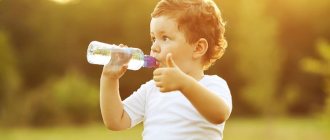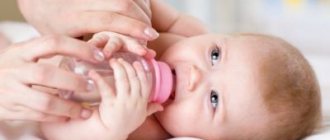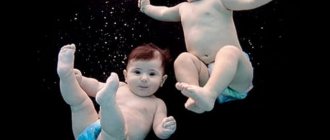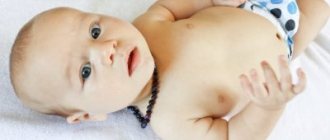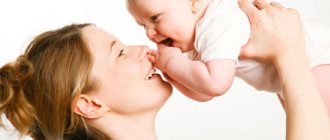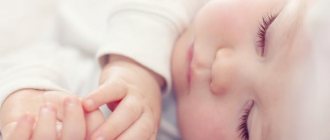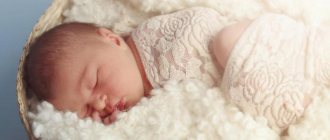A caring mother often controls how much food the child eats per day and how much liquid he drinks. The norm for food consumption for children can still be found in various sources, but with the volume of liquid everything is ambiguous. Some parents notice that their child drinks a lot, and whether this is good or bad, we will try to figure it out in this article.
Water volume standards per day
The body's need for water depends on the child's age, body weight and a number of other factors.
The body's need for water depends on age, body weight, health status, physical activity of the child and even the time of year. The amount of water required by the body is also affected by the intensity of all types of metabolism.
Average required volumes of fluid per day depending on age:
- up to 3 years – 0.6-0.8 l;
- from 3 to 7 years – from 1 l to 1.7 l;
- from 7 to 12 years – 1.7-2 l;
- over 12 years old - 2-2.2 liters.
These calculations are average, but the individual characteristics of the organism must also be taken into account.
This need for fluid is associated with the child’s rapid growth, significant mental stress and physical activity. The desire to drink is called thirst.
In addition to water, the daily amount of required fluid includes:
- liquid from the first course;
- jelly;
- compote;
- juices;
- milk;
- tea.
Why does the baby drink a lot of water?
An adult should drink at least one and a half liters of water per day. More accurately, the amount of fluid required can be determined based on the person’s weight.
As for the child, the amount of water needed by the child’s body depends on the environmental conditions (amount of clothing, air temperature and diet), on the baby’s motor activity and the biochemical characteristics of the child’s body.
Many sources provide the following approximate indicators of how much fluid a child should consume per day:
- for a child under three years old - 700-800 ml;
- for a child over 3 years old - a liter;
- for a child over seven years old - 1.2-1.7 l;
- for children over 12 years old - 2.2 l.
It must be borne in mind that in this case liquid means not only clean water, but also compotes, soups, teas, etc. etc.
It is not surprising if a child often drinks during diarrhea or vomiting, after fatty or salty foods, at high temperatures, after intense physical activity, in hot and stuffy conditions.
If parents think that the child drinks a lot, first of all, it is necessary to adjust the microclimate in the room. The air in the nursery should be cool (not higher than 23 degrees Celsius), clean and humid (not less than 50%).
If the baby is fed breast milk, it may need to be supplemented (no more than 100-200 ml of water per day). This is easy to check: offer your baby clean water between feedings. If the baby does not want to drink, he will refuse water.
Often a child drinks a lot of water when introducing complementary foods or changing their diet. Sometimes, when the flow of bile is disrupted, the baby develops an unpleasant bitter taste in his mouth, which he tries to wash down or eat.
Young children may drink frequently simply because they need to suck. If the baby does not suck on a pacifier or breast, he fulfills this need by drinking compotes and teas from a bottle.
If a child is really thirsty, he drinks clean water with pleasure, so in many cases, drinking tea, juice or compote is nothing more than a way to get pleasure.
Causes of thirst
The reasons for a child’s consumption of large volumes of water can be physiological or pathological, that is, associated with some kind of disease.
Physiological causes of night thirst
- Associated with the nature of nutrition, with the consumption of certain foods. It can be:
- meat dishes;
- cereal dishes;
- hard cheeses of different varieties;
- salted and pickled vegetables.
Consumption of these products causes increased thirst and requires water to improve digestion. You should not feed your baby abundantly before going to bed. The child will drink more due to overeating or if he eats dry food. Infants drink a lot when complementary foods are introduced into their diet.
It is also not recommended to feed your child before bedtime foods that promote increased formation of gases in the intestines. Bloating will cause discomfort that will prevent your baby from sleeping peacefully. The child does not understand the reasons for the anxiety and asks for a drink.
- Climatic conditions. On hot days in summer, high temperatures and dry air can lead to excess fluid loss from the body, especially in young children.
Even in the cold season of the year, if the conditions for a comfortable microclimate are not created in the apartment (humidity above 50% and air temperature 18-22 0C), then the need for water will increase.
The child will and should drink more fluids in such conditions. Wet daily cleaning of the room, air humidification, ventilation, and air conditioning will prevent overheating of the child's body.
- Clothes that do not correspond to the weather conditions or microclimate in the apartment. Too warm, tight-fitting clothes, especially those made of synthetic fabric, contribute to disruption of thermoregulation, which increases thirst.
- The baby's desire to satisfy the sucking reflex can also be the reason for consuming significant amounts of liquid at night. This can be observed in babies whose mother has stopped breastfeeding, which is why they require drinking from a bottle with a nipple several times during the night.
- The baby does not have enough parental attention, and he asks for a drink, turning it on himself (according to psychologists).
- The child has developed a habit: if he quenches his thirst during the day with juice, compote, or sweetened tea, then at night he will demand exactly that. The developed habit not only prevents the baby and parents from resting, but can also negatively affect the condition of tooth enamel and cause a malfunction of the endocrine glands.
Determining whether a child is really thirsty, or whether it is a desire for sweet compote or tea, is very simple: offer him to drink only water. If the baby becomes capricious and refuses water, it means there is no thirst and the mother has nothing to worry about.
Some children, waking up at night, demand to drink, as they are used to falling asleep only after eating or drinking. Older children, not wanting to fall asleep after waking up, can invent activities (“I want to drink”, “I want to go to the toilet”, “I want to eat”, etc.). To avoid such awakenings at night, experts do not advise feeding your child foods that can cause thirst during dinner.
Pathological causes of thirst
Dry mouth and increased fluid intake may be associated with the child’s painful condition:
- An increase in body temperature during an infectious or cold disease or teething contributes to the appearance of strong thirst and, accordingly, an increase in the volume of fluid drunk. Drinking plenty of water helps lower the temperature.
- Vomiting and diarrhea can lead to dehydration, one of the symptoms of which will be severe thirst.
But these diseases are acute, that is, drinking large quantities of liquid will be a transient, temporary phenomenon.
If a child constantly drinks a lot at night, then a consultation with a pediatrician is necessary to rule out diseases such as diabetes insipidus or diabetes mellitus, pathology of the brain, thyroid gland, kidneys and liver. Most likely, in these cases the child will drink a lot of liquid not only at night, but also during the day.
To make it easier for the doctor to make a diagnosis, parents need to pay attention to the presence of the following symptoms in the child:
- rise in body temperature in the morning and evening;
- headache;
- changed color of urine;
- the amount of liquid drunk does not correspond to the volume of urine excreted per day;
- pain in the abdomen, lower back and other parts of the body;
- decreased or increased appetite;
- a sharp increase or decrease in body weight;
- increased fatigue;
- the presence of edema and its localization;
- constant dry mouth;
- increased nervousness.
If your child exhibits any of the listed symptoms, you should not delay a visit to the pediatrician. After the examination, the doctor may prescribe, if necessary, an examination (blood and urine tests, determination of blood sugar, blood tests for hormones, ultrasound), and a consultation with an endocrinologist.
Why does a child drink a lot of water at night?
You should separately consider the situation when a child often drinks at night. When your baby is trying to sleep in the evening or he wakes up in the middle of the night, then giving him something to drink or eat is the easiest and simplest way to fall asleep. On the other hand, if the baby does not want to sleep, he will delay going to bed in every possible way.
If a child drinks a lot at night because he wakes up from thirst, then you should, again, pay attention to the temperature in the nursery. Dry and warm air in the room where the baby sleeps does not contribute to healthy and sound sleep. It is better to cover the child with a warm blanket and put pajamas on him, but make the air in the room cool. Before going to bed, do not offer your baby food that increases thirst.
Summary for parents
The need for fluid, including at night, increases sharply during periods of child illness, accompanied by an increase in body temperature.
A child may drink a lot of fluids at night for a variety of reasons. This may be due to nutrition or the microclimate in the children's room, with the habit of falling asleep only after satisfying their need for sucking, if they drink from a bottle with a nipple, and not from a cup.
The cause of “night watering” may be an excessively heavy dinner or drinking juices or compote instead of water during the day. In this case, the baby will want to drink them at night.
But thirst and large amounts of water consumed may indicate the development of certain diseases. If you have the slightest doubt about the cause of thirst, you should consult a pediatrician so that the examination and diagnosis can be carried out in a timely manner.
Can the weather cause night thirst in a child?
Of course, the weather also affects our water consumption. And the hotter it is outside, the less humidity, the more we want to drink. If during the summer your child’s need for water increases, then most likely it’s a matter of temperature. Water is a kind of regulator of body temperature, and allows you to lower it if necessary, which is extremely important in the hot season. To prevent such problems at night, it is necessary to control the humidity and temperature in the room. And also make sure that your baby drinks the appropriate amount of water for her age throughout the day.
Quite often, children ask for water at night because they sleep in too warm pajamas or under a warm blanket. The child is simply hot in such conditions, and the desire to drink in this situation is absolutely normal and does not indicate any disease. Here it is necessary to choose light, breathable materials for sleeping, and not to wrap the child unnecessarily. The same applies to children one year old or less. From an early age, try to dress your child correctly depending on the temperature.
If thirst occurs at night in a child who has recently been switched from breastfeeding to artificial feeding, then the increased need for water may indicate that the baby still has a need to satisfy the sucking reflex. To prevent such situations from arising, it is necessary to start complementary feeding and give water to the child not from a bottle with a nipple, but from a spoon or special cups. Children also drink from them with pleasure.
Also, if a child asks for water at night, then perhaps he is simply afraid to sleep alone. The child lacks the attention of his parents, and he tries to compensate for this by attracting attention to himself in this way. Here it is necessary to create comfortable conditions for the child in the room so that such behavior does not become a habit.
